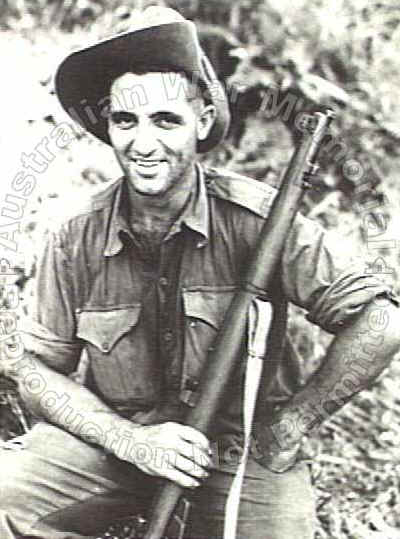When Tom ‘Diver’ Derrick appeared on the front cover of the Australian Women’s Weekly in May 1944, he became a national hero. His Victoria Cross, the fourth to be awarded during the Pacific War, was awarded at Sattelberg in New Guinea.
Sergeant Thomas Derrick’s battalion, the 2/48th, was attacking Japanese positions on the heights of Sattelberg, near Finschhafen on 24 November 1943. The Japanese had dug in and were vigorously defending their position when Derrick’s platoon was ordered to withdraw for the night. Derrick, refusing to give in, instead set off alone up the cliff face towards the Japanese positions with a haversack of grenades. Despite their gunfire, he was able to hurl grenades into eight Japanese positions and reach the summit of the hill.
http://www.ww2australia.gov.au/pushingback/index.html
That summary doesn’t give the flavour of a sustained lone attack against seemingly impossible odds while he clawed his way up a cliff.
This reflects Derrick’s character, which endeared him to his men. After Sattelberg was taken, a fresh battalion came up to reinforce the position, running into Derrick and his platoon. Sgt Derrick said to the battalion’s colonel, in the hearing of his own platoon and various officers and OR’s in the reinforcement battalion
“My platoon took it. I hope your battalion can hold it.”
It was typical of the man that he would not leave his own battalion. When offered a chance to attend an Officers’ Training School by the then chief of staff (Lieutenant-General J. Northcott) Derrick refused acceptance unless he was assured of being allowed to return to the 2/48th Battalion. It was against the established custom, but General Northcott made an exception.
That fateful decision cost “Diver” Derrick his life. He received his commission on 25 November 1944 and returned to his beloved battalion as a platoon commander-a position he had frequently filled as a sergeant-in time to train for the desperate fighting ahead at Tarakan.
Well-intentioned people have wondered why the Army Command should send him back after he had done so much, but it was his own wish, and one which is understood by those who knew him.
At Tarakan, Lieutenant Derrick, fighting as an officer after five years in the ranks, led his platoon inspiringly, making long personal reconnaissances, and moving boldly in the open during attacks.
Mortally wounded during a night counterattack he still continued to inspire his men, and when the stretcher-bearers arrived in the morning sent the other wounded out first, although he knew he had but a slight hold on life. Blood transfusions failed to stir his strong heart, and on that day, 23 May 1945, he died.
http://www.diggerhistory.info/pages-vc/derrick-vc.htm

